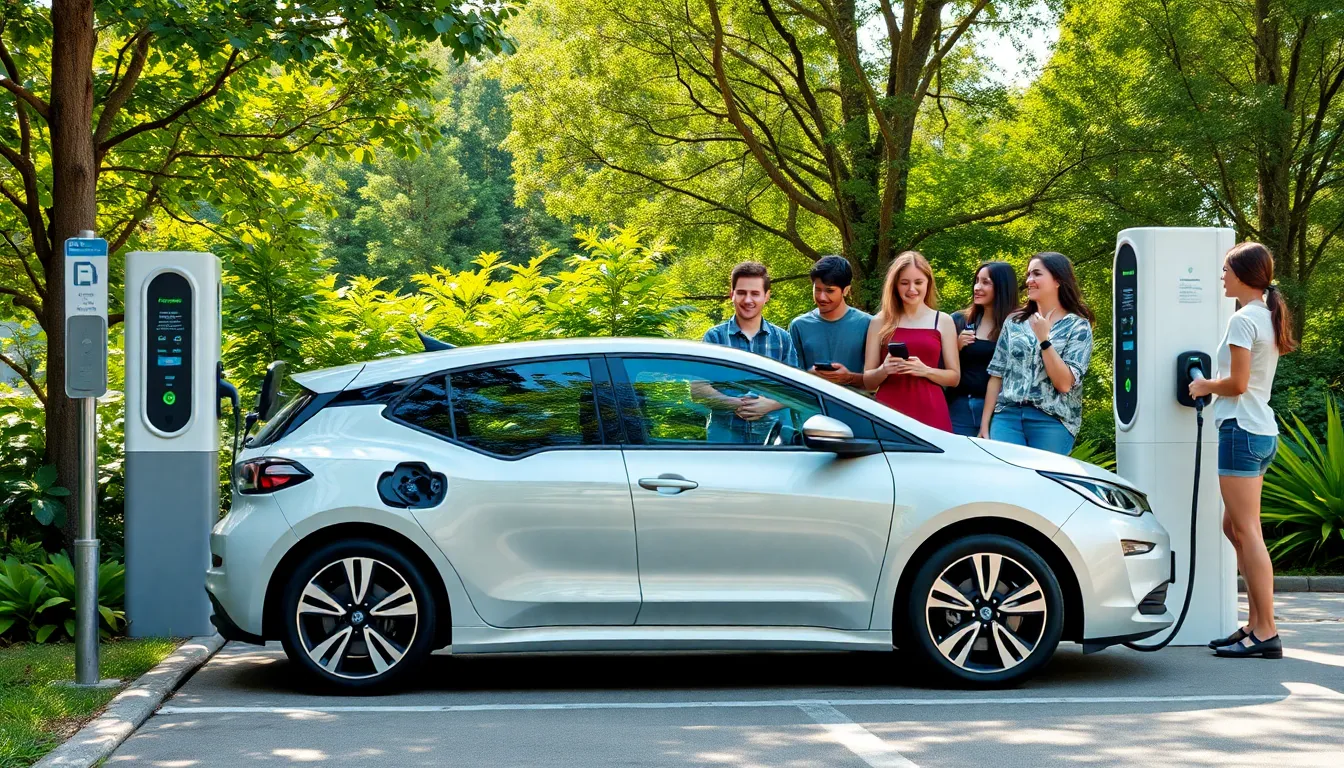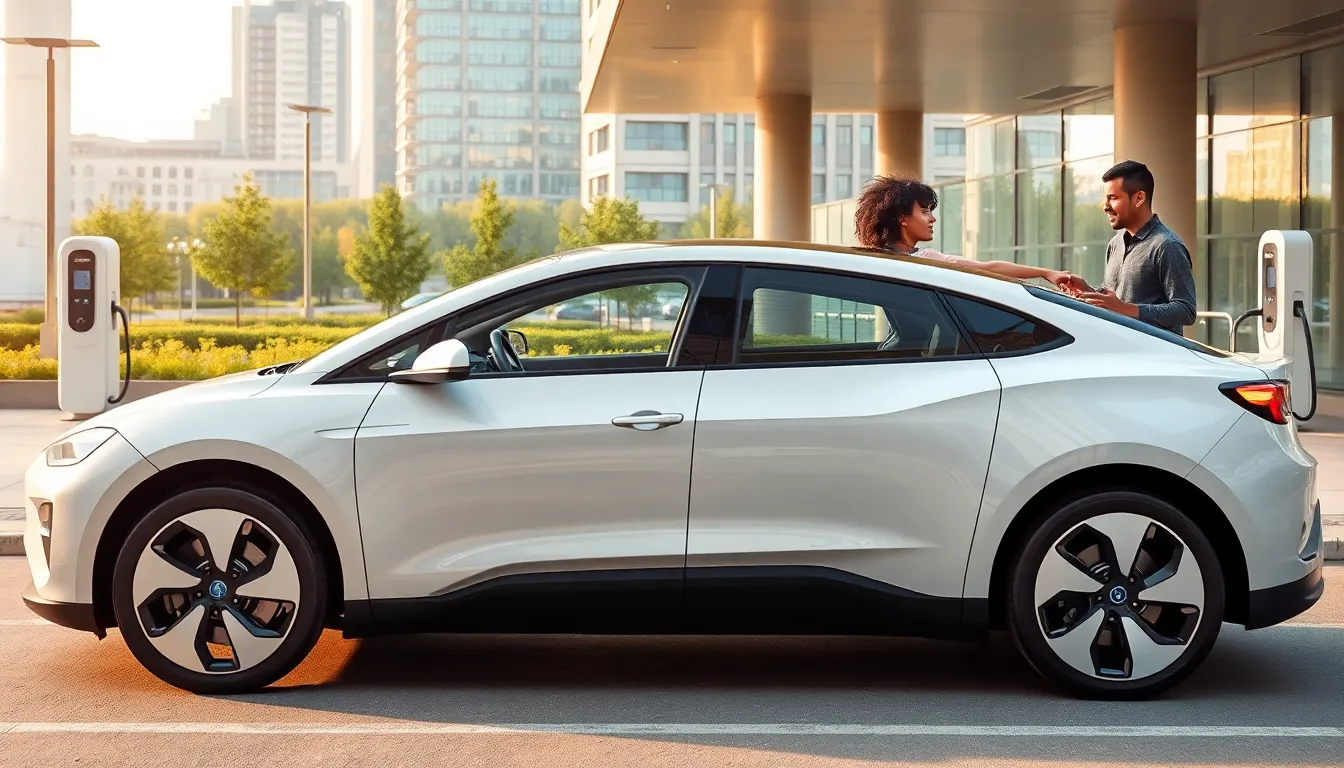Table of Contents
ToggleThe electric car market is zooming ahead faster than a kid on a sugar rush. With environmental concerns and soaring gas prices, more drivers are trading in their gas guzzlers for sleek, silent rides. It’s not just a trend; it’s a revolution on wheels, and it’s gaining momentum with each passing year.
As more manufacturers jump into the electric vehicle game, consumers are treated to a buffet of options that cater to every taste and budget. From stylish sedans to rugged SUVs, the electric vehicle lineup is growing faster than you can say “range anxiety.” So buckle up and get ready to explore the electrifying growth of the market that’s not just about saving the planet but also about enjoying the ride.
Overview of Electric Car Market Growth
Electric car market growth continues to accelerate, reflecting a significant shift in consumer preferences and industry dynamics. Global electric vehicle (EV) sales reached approximately 10 million units in 2022, showcasing a growth rate of 55% compared to the previous year. This rapid increase illustrates the rising demand for sustainable transportation options.
Factors driving this expansion include heightened environmental awareness and fluctuating fuel prices. As gas prices climb, consumers increasingly consider electric vehicles a viable alternative. Improved battery technology also plays a crucial role, enabling longer ranges and faster charging times for many models.
Numerous manufacturers now compete in the electric car sector, providing consumers with a diverse selection of vehicles. Notable brands such as Tesla, Ford, and Volkswagen have introduced various electric models to meet different market needs. With options ranging from compact cars to spacious SUVs, consumers enjoy better accessibility to EVs than ever before.
Government incentives further stimulate the electric car market. In 2023, several governments offer tax credits and rebates to encourage the purchase of electric vehicles. Additionally, investment in charging infrastructure boosts consumer confidence, easing concerns about range anxiety.
Predictions indicate that electric vehicle sales will account for 30% of global auto sales by 2030. Analysts identify significant opportunities for growth in emerging markets, fueled by increasing urbanization and supportive policies. Electric car market growth indicates a transformative movement in the automotive industry, as it embraces cleaner, more sustainable technologies.
Key Factors Driving Market Growth

Electric cars are gaining traction due to multiple driving factors. Consumers increasingly favor electric vehicles, resulting in higher adoption rates.
Technological Advancements
Battery technology improvements enhance electric vehicle performance significantly. Longer ranges and shorter charging times make electric cars more appealing. Innovative features like regenerative braking and smart connectivity further entice potential buyers. Manufacturers invest heavily in research and development, propelling ongoing enhancements in efficiency and functionality.
Government Policies and Incentives
Supportive government policies facilitate electric vehicle adoption. Tax credits and rebates provide financial relief for consumers purchasing electric cars. Many countries implement stringent emissions regulations, compelling manufacturers to shift towards greener options. Investments in charging infrastructure enhance accessibility, easing common concerns related to range anxiety.
Consumer Demand and Preferences
Growing environmental consciousness drives consumers toward sustainable options. Shifts in preferences indicate a desire for cleaner transportation solutions. Increasing numbers of buyers view electric vehicles as a viable alternative to traditional gas cars. Young buyers champion the movement for eco-friendly technologies, further shaping the market’s future direction.
Regional Growth Trends
Regional dynamics significantly impact electric car market growth, showcasing distinct trends and consumer behaviors across various locations.
North America
North America exhibits a robust electric vehicle market, driven by strong consumer interest and substantial manufacturer investment. In 2022, electric vehicle sales exceeded 1.5 million units, reflecting a remarkable year-over-year growth of over 65%. Major players like Tesla and Ford lead the charge, offering enticing models ranging from sedans to trucks. Legislative support, such as federal tax incentives, further encourages adoption among consumers. Increasingly, states like California and New York implement stringent emissions regulations, promoting electric vehicle usage. Enhanced charging infrastructure is also expanding, reducing range anxiety for potential buyers.
Europe
Europe shows an impressive growth trajectory in the electric car market, supported by ambitious sustainability goals. In 2022, over 3 million electric vehicles were sold, marking a growth rate of 70% compared to the previous year. Countries like Norway and Germany are pioneering this transition, with Norway reporting electric vehicles making up over 50% of total car sales. Incentives including rebates and access to low-emission zones attract environmentally conscious consumers. European manufacturers, such as Volkswagen and BMW, introduce competitive models that appeal to various demographics. Advanced charging networks facilitate convenient access, ensuring seamless integration into daily life.
Asia-Pacific
In the Asia-Pacific region, electric vehicle growth accelerates, driven by rapid urbanization and increasing government support. China leads the global market, with sales surpassing 6 million units in 2022, indicating a remarkable 80% increase. Domestic brands like BYD and NIO dominate while global brands expand their presence. Government initiatives, including subsidies and investment in charging infrastructure, stimulate consumer demand. Japanese markets also trend upward, with brands like Toyota investing heavily in hybrid and electric technologies. The region’s commitment to sustainable mobility paves the way for substantial future growth in electric vehicles.
Challenges Facing the Market
Challenges persist in the electric car market despite its growth. These obstacles hinder potential expansion and adoption.
Infrastructure Development
Charging infrastructure remains insufficient in many regions. Public charging stations aren’t as widely available as necessary, creating range anxiety among consumers. Urban areas often lack the needed charging facilities, while rural locations struggle even more. Limited access to charging points can deter buyers from making the switch to electric vehicles. Investment in expanding charging networks is crucial to support future market growth. Solutions like fast-charging stations at strategic locations can alleviate concerns. The establishment of home charging options also plays a significant role in enhancing convenience for electric vehicle owners.
Battery Technology Limitations
Battery technology poses significant challenges for the electric vehicle market. High costs associated with battery production still affect the overall price of electric cars. Current battery performance varies, with concerns about range impacting buyer decisions. Charging times also remain a factor, as longer wait periods can discourage potential users. Additionally, sustainability issues tied to battery production and disposal require immediate attention. Research into alternative materials and improved recycling processes can help address these concerns. Continuous advancements in battery technology are essential for boosting consumer confidence and enhancing electric vehicle adoption rates.
Future Outlook for Electric Car Market Growth
The electric car market shows strong potential for continued expansion. Predictions estimate electric vehicle sales could represent 30% of global auto sales by 2030. This growth stems from urbanization trends and supportive government policies, particularly in emerging markets.
Technological advancements continue to enhance the appeal of electric vehicles. Improved battery performance, for example, provides longer ranges and quicker charging times. Features such as regenerative braking attract consumers looking for innovative driving experiences. Increased investments in charging infrastructure also mitigate concerns about range anxiety, facilitating broader adoption.
Regional dynamics reveal varied growth patterns. North America saw sales exceed 1.5 million units in 2022, driven by substantial manufacturer investment and consumer interest. Europe, too, experienced impressive sales figures, topping 3 million units and showcasing a 70% growth rate. Norway stands out in Europe with its rapid transition to electric vehicles.
China remains pivotal in the Asia-Pacific region, witnessing sales surpass 6 million units in 2022. Government support and rapid urbanization bolster this remarkable growth. Consequently, the electric vehicle landscape becomes increasingly competitive.
Challenges persist despite the optimistic outlook. Insufficient charging infrastructure poses a significant barrier, particularly in rural areas. Investment is crucial to expanding networks and establishing home charging solutions. Additionally, battery technology issues, such as high production costs and environmental concerns, require ongoing research and development.
Ultimately, the shift toward electric vehicles signifies a transformative movement in the auto industry. As the market evolves, continued focus on technological advancements and infrastructure improvements will play a critical role in fostering consumer confidence and ensuring sustainable growth.
The electric car market is poised for remarkable growth as it navigates the challenges and opportunities ahead. With increasing consumer demand for sustainable options and ongoing technological advancements, the transition to electric vehicles is gaining momentum. Enhanced battery performance and expanding charging infrastructure are crucial in addressing range anxiety and making electric cars more accessible.
As governments worldwide implement supportive policies, the landscape for electric vehicles will continue to evolve. The commitment from major manufacturers and the enthusiasm of younger consumers signal a promising future for the industry. The shift toward electric vehicles represents not just a change in transportation but a significant step toward a more sustainable future.




